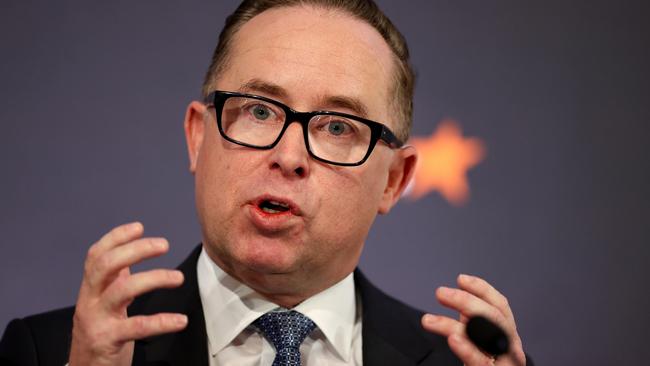Qantas unveils corporate ‘green team’ to help it achieve net zero by 2050
Qantas has roped in five of its corporate mates to increase pressure on Canberra to invest in locally- produced, sustainable aviation fuel.

Qantas has unveiled a “green team” of corporate heavyweights to help demonstrate to the federal government the demand for a local sustainable aviation fuel industry.
Australia Post, Woodside Energy, Macquarie Group, KPMG Australia and Boston Consulting Group have joined the airline in a “sustainable aviation fuel coalition”.
As foundation members of the coalition, the companies will pay a premium to reduce around 900 tonnes of their air carbon emissions each year by contributing to the cost of SAF rather than using traditional carbon offsets.
Qantas would not comment on the size of the companies’ contribution but said it would go towards the cost of up to 10 million litres of SAF sourced out of London’s Heathrow Airport.
Another deal was in place to buy a further 20 million litres of SAF in the US from 2025.
Qantas chief executive officer Alan Joyce said air travel was a crucial part of doing business for many companies who also wanted to reduce their impact on the environment.
“The demand for SAF has never been higher but supply is lagging well behind, particularly without a local industry in Australia and that’s keeping prices several times more expensive than jet kerosene,” Mr Joyce said.
“The more leading corporates that join our coalition, the more feasible a local industry becomes and the more cost effective the fuel becomes.”
In return for their support, the SAF coalition companies would receive enhanced reporting on the emissions from their flying activity, and their employees would be able to access Qantas’s frequent flyer “green tier”.
As well as lobbying the government to support local SAF production, Qantas and Airbus were investing up to $200m in projects that helped produce SAF.
Qantas was also in negotiations with a number of offshore suppliers to source more SAF which was in high demand globally.
SAF could be produced from certified bio feedstock including used cooking oil, energy crops, forestry residue, animal tallow and other waste products.
When blended with fossil fuel, it produced up to 80 per cent fewer emissions on a life cycle basis compared with traditional jet kerosene.
By 2030 Qantas planned to use 10 per cent SAF in its overall fuel mix, and about 60 per cent by 2050.
Most modern jet aircraft could operate on a 50-50 mix of SAF and jet kerosene and manufacturers were working to achieve 100 per cent SAF capability in the next decade.




To join the conversation, please log in. Don't have an account? Register
Join the conversation, you are commenting as Logout